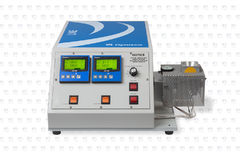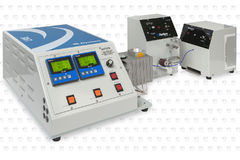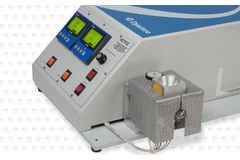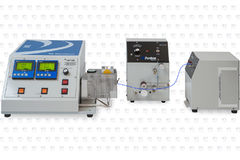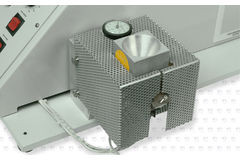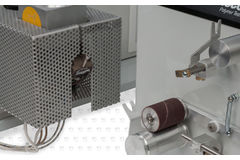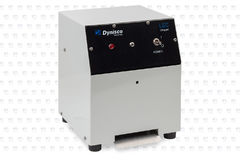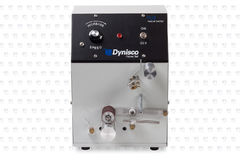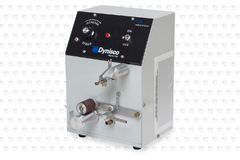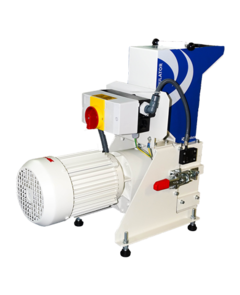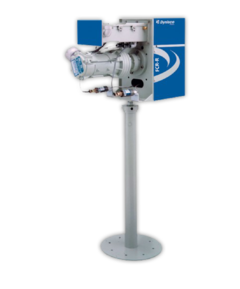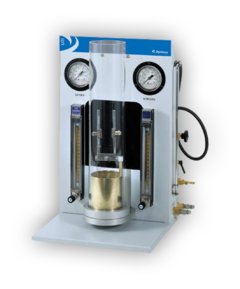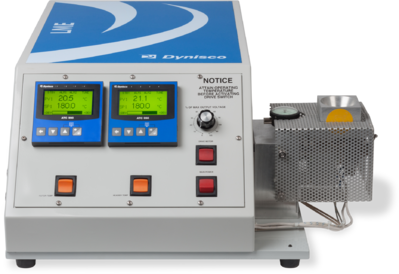
LME - Laboratory Mixing Extruder
The Dynisco Polymer Test LME Laboratory Mixing Extruder is a unique laboratory tool developed to evaluate the processability of a variety of plastics and rubbers prior to production. From very fine powders to coarse materials, the LME will meet many extruding needs. The LME possesses a movable header and dial gage that allows for constant mixer adjustability. While in operation, the rotational shearing (mixing) is controlled by adjusting the distance between the end of the rotor and the inside header. This unique feature, not found in other extruders, allows for various extrudate mix levels in a single sample run. The rotational shearing of the LME system provides extensive and intensive mixing and can be used in the production of polymer blends or alloys. These blends have been found homogeneous enough to be spun into fibers over the entire range of composition. Since mixing may be independently adjusted, agglomerates of additives, such as fillers or pigments, may be accurately controlled.
In this series can be configured according to your needs. Contact us, we will be happy to help you.
Laboratory Mini Extruder - LME
Laboratory Mini Extruder - LME
Laboratory Mini Extruder - LME
Laboratory Mini Extruder - LME
Laboratory Mini Extruder - LME
Laboratory Mini Extruder - LME
Laboratory Mini Granulator
Laboratory Mini Extractor to Extruder
Laboratory Mini Extractor to Extruder
Inquiry system
Configure your own device, according to your requirements and needs. If you are not sure about the configuration, make the necessary information about the processed materials in the notes. Thanks to this information, we are able to create several offers depending on the equipment and after consultation you can choose according to your needs. If you need a comparison for tenders, we will be happy to help you find an alternative product from the Dynisco portfolio.
If you need more information do not hesitate to contact us.
Dynisco Configuration Code:
Evaluate the Processability of your Plastics
Dynisco Laboratory Mixing Extruder (LME)
 The Dynisco Polymer Test LME Laboratory Mixing Extruder is a unique laboratory tool developed to evaluate the processability of a variety of plastics and rubbers prior to production. From very fine powders to coarse materials, the LME will meet many extruding needs. The LME possesses a movable header and dial gage that allows for constant mixer adjustability. While in operation, the rotational shearing (mixing) is controlled by adjusting the distance between the end of the rotor and the inside header. This unique feature, not found in other extruders, allows for various extrudate mix levels in a single sample run. The rotational shearing of the LME system provides extensive and intensive mixing and can be used in the production of polymer blends or alloys. These blends have been found homogeneous enough to be spun into fibers over the entire range of composition. Since mixing may be independently adjusted, agglomerates of additives, such as fillers or pigments, may be accurately controlled.
The Dynisco Polymer Test LME Laboratory Mixing Extruder is a unique laboratory tool developed to evaluate the processability of a variety of plastics and rubbers prior to production. From very fine powders to coarse materials, the LME will meet many extruding needs. The LME possesses a movable header and dial gage that allows for constant mixer adjustability. While in operation, the rotational shearing (mixing) is controlled by adjusting the distance between the end of the rotor and the inside header. This unique feature, not found in other extruders, allows for various extrudate mix levels in a single sample run. The rotational shearing of the LME system provides extensive and intensive mixing and can be used in the production of polymer blends or alloys. These blends have been found homogeneous enough to be spun into fibers over the entire range of composition. Since mixing may be independently adjusted, agglomerates of additives, such as fillers or pigments, may be accurately controlled.
Procedure
 A sample material is placed in a cooled hopper where it falls onto the heated surface of a cylindrical rotor. As the rotor turns, the material drags against the inclined surface of the stationary scroll. This motion begins transport toward the outlet die. As the material collects in the radial gap it is compressed by the converging space between the scroll surface and end of the header case. The material then moves to the axial gap where it is rotationally sheared between the end of the rotor and inside of the case. This motion induces a centripetal pumping effect, enabling the material to flow to the outlet die and exit through the orifice.
A sample material is placed in a cooled hopper where it falls onto the heated surface of a cylindrical rotor. As the rotor turns, the material drags against the inclined surface of the stationary scroll. This motion begins transport toward the outlet die. As the material collects in the radial gap it is compressed by the converging space between the scroll surface and end of the header case. The material then moves to the axial gap where it is rotationally sheared between the end of the rotor and inside of the case. This motion induces a centripetal pumping effect, enabling the material to flow to the outlet die and exit through the orifice.
Recommended Features
LME TAKE UP SYSTEM
 The Take Up System is a multi-purpose variable drive machine. It can draw and wind very small diameter extrudate fibers from the LME onto a spindle or draw larger rods through a pair of nip rollers. The nip rollers can also be used with the optional ribbon header. In all cases, the speed of the system can be adjusted to match the rate of extrusion and provide the desired fiber/rod diameter or tape/ribbon width. The nip rollers are also used to guide the extrudate rod to the Chopper (pelletizer) system.
The Take Up System is a multi-purpose variable drive machine. It can draw and wind very small diameter extrudate fibers from the LME onto a spindle or draw larger rods through a pair of nip rollers. The nip rollers can also be used with the optional ribbon header. In all cases, the speed of the system can be adjusted to match the rate of extrusion and provide the desired fiber/rod diameter or tape/ribbon width. The nip rollers are also used to guide the extrudate rod to the Chopper (pelletizer) system.
LME CHOPPER
 The Chopper pelletizes the extrudate from the Take Up System. Extrudate feeds into the chopper inlet from the nip roller of the Take Up System. The size of the pellets is determined by the feed speed to the chopper.
The Chopper pelletizes the extrudate from the Take Up System. Extrudate feeds into the chopper inlet from the nip roller of the Take Up System. The size of the pellets is determined by the feed speed to the chopper.
Performance Characteristics
| Dimensions: |
19"W x 24"D x 9"H (49cm x 61cm x 23cm) |
| Standard Header: |
1/8 (0.312cm) diam. orifice (replaceable) rod extrusion |
| Weight: |
120 lbs. (54.5kg) |
| Cooling Water Feed Hopper: |
1 gal/hr tap water (3.785/hr) |
| Electrical: |
230V, 50Hz/120V, 60Hz |
USES AND APPLICATIONS
| Plastics and rubbers |
| Pelletizing |
| Shape extrusions |
| Polymer blends |
| Film extrusions |
| Fiber spinning |
| Wire coating |
| Melt spinning |
COMPOUNDING OF:
| Stabilizers |
| Fillers |
| Plasticizers |
| Flame retardants |
| Pigments |
| Antioxidants |
| Pharmaceuticals |
| Additives |
The Dynisco MiniGran Lab Granulator is designed for the granulation of small sprues. With its very compact dimensions, this granulator can be accommodated almost anywhere and therefore is very suitable for laboratory applications. The granulator is suitable for all kind of plastic materials, due to the low rotor speed the plastic materials are processed to high-quality, low-dust regrind.
Specifically designed for the thermoplastics resin industry. The ViscoIndicator duplicates the test conditions of a laboratory Melt Flow Rate (MFR) tester or capillary rheometer. Melt viscosity measurements such as melt flow rate and Intrinsic viscosity are primary specifications of thermoplastic resins.
Dont forget- our ViscoIndicator is IoT enabled. The IoT native software of the ViscoIndicator allows for real-time access to your testing information.With the Dynisco Cloud Connect Subscription, you get comprehensive access of rheological data, correlations, and dashboards. This interface allows for a complete “Window into the Process” providing valuable insight to your polymer process.
Specifically designed for the thermoplastics resin industry, the Dynisco CMR series can be configured to measure melt flow rate, high/low load melt flow rate, apparent viscosities, or to perform other customer defined tests.The CMR system consists of two parts: a rheometer head connected directly to the process which samples, conditions, and measures the melt flow of the resin, and an RCU (Rheometer Control Unit) that controls the CMR test parameters (temperature, pressure, rate), and provides outputs of computed results, and communications to an external distributed control system when required.
Specifically designed for the synthetic fiber production industry, the Dynisco FCR-R series can be configured to measure a range of apparent shear viscosities, dual melt flow rate, simultaneous melt flow rate and extensional viscosities using the Cogswell Equations. The FCR-R system consists of two parts: a rheometer head and a rheometer control unit (RCU). The rheometer head is connected directly to the process which samples, conditions, and measures the melt viscosity of the molten resin through two separate dies. The RCU controls the rheometer test parameters (temperature, pressure and rate) and takes in data from the measurement head as well as provides outputs of computed results.
Not Available
The advanced LOI Limiting Oxygen Index Chamber accurately determines the relative flammability of plastics and other materials. It conforms to ASTM D2863 and ISO 4589-1, ISO 4589-2 standards and provides a means for safely determining the relative flammability of materials by measuring the minimum oxygen concentration that will support combustion. The test specimens are burned in a precisely controlled atmosphere of nitrogen and oxygen. The operator adjusts the supply gases and uses the flowmeter readings to calculate the oxygen index.
 Overview of Available Certificates and Approvals: Visit this link, which will take you to a page with a comprehensive list of current certificates and approvals for our products. Here, you can verify that our offerings meet the highest standards of quality and safety.
Overview of Available Certificates and Approvals: Visit this link, which will take you to a page with a comprehensive list of current certificates and approvals for our products. Here, you can verify that our offerings meet the highest standards of quality and safety.
 Discover the world of our online E-Learning page and find out how to streamline your daily use of our products. Our practical and comprehensive courses and informational materials will show you how to simplify and enhance the use of our technologies, uncover new information and techniques, and optimize work processes. With these resources, you'll achieve higher efficiency, save time, and improve your work results.
Discover the world of our online E-Learning page and find out how to streamline your daily use of our products. Our practical and comprehensive courses and informational materials will show you how to simplify and enhance the use of our technologies, uncover new information and techniques, and optimize work processes. With these resources, you'll achieve higher efficiency, save time, and improve your work results.
 Our instructional videos offer an interactive way to learn about our products. Combining visual and auditory content, they provide practical solutions to common issues, saving you time and avoiding potential problems. If you encounter an issue, our video manuals offer detailed instructions and practical tips to help you resolve it. Available at any time, they provide a convenient resource that complements our technical support.
Our instructional videos offer an interactive way to learn about our products. Combining visual and auditory content, they provide practical solutions to common issues, saving you time and avoiding potential problems. If you encounter an issue, our video manuals offer detailed instructions and practical tips to help you resolve it. Available at any time, they provide a convenient resource that complements our technical support.
 Our technical articles offer a practical way to learn more about our products and their use. They provide detailed information and practical tips on how to solve common problems, saving you time and helping you avoid potential issues. If you still encounter a problem, our technical articles offer specific instructions for solving it. They are available at any time and are a convenient source of information that complements our technical support.
Our technical articles offer a practical way to learn more about our products and their use. They provide detailed information and practical tips on how to solve common problems, saving you time and helping you avoid potential issues. If you still encounter a problem, our technical articles offer specific instructions for solving it. They are available at any time and are a convenient source of information that complements our technical support.









